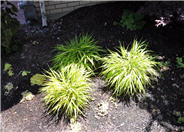
Common name:Golden Variegated Hakone grass
Botanical name:Hakonechloa macra 'Aureola'
Golden Variegated Hakone grass is a lush and graceful ornamental grass. The cascading, hair-like foliage is broad and variegated with cream, chartreuse, and green. Illuminates dark corners and adds texture. Particularly effective planted under shrubs and small trees with contrasting foliage, such as viburnums, hydrangeas, and japanese maple.
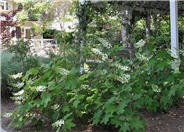
Common name:Oakleaf Hydrangea
Botanical name:Hydrangea quercifolia
Oakleak hydrangea is a deciduous, summer blooming shrub with an irregular, rounded habit growing about 6 to 8 feet tall and wide. Green leaves are large and deeply lobed, and reminiscent of oak leaves; fall color is a rich burgundy. White flower clusters appear in mid summer in erect, terminal panicles; flowers slowly age to a pinkish-purple color and persist into the fall. Mature stems exfoliate to reveal a rich brown inner bark which is attractive in winter. Fabulous in the shady shrub or foundation border. Excellent cut flower. Many selections available.
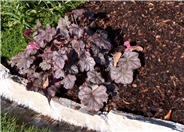
Common name:Ruby Veil Coral Bells
Botanical name:Heuchera 'Ruby Veil'
'Ruby Veil' is a heuchera hybrid with rounded, lobed leaves in a distinctive ruby red to maroon hue, with darker veining and silver blotches. The plant grows about 8 to 12 inches tall. White flowers appear on tall stems in early summer.
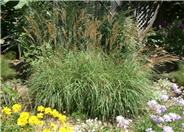
Common name:Japanese Silver Grass, Maiden grass
Botanical name:Miscanthus sinensis
Miscanthus is a large group of ornamental grasses ranging from a few feet to over 7 or 8 feet tall. Blade colors range from solid green, to green with silver mid-ribs, to variegated forms. Plumes are generally held well above foliage clumps, appearing in late summer to early fall, depending on the variety, and may be cut for fresh or dry arrangements.
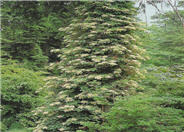
Common name:Climbing Hydrangea
Botanical name:Hydrangea anomala petiolaris
This Hydrangea grows as a slow, deciduous vine, clinging by adhesive, aerial rootlets like english ivy. Its wide, heart shaped, deep green leaves offer a nice contrast to the white lacecap flowers which appear in summer. Grow in sun to part shade, in our climate it grows best on east or north walls and fences. It can eventually grow 40 to 60 feet, but that will take quite a bit of time, and its size can be controlled through selective pruning. Deciduous.
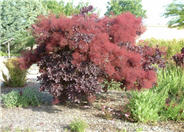
Common name:Purple Smoketree
Botanical name:Cotinus coggygria 'Purpureus'
Purple Smoketree is a deciduous shrub with a multi-stemmed, upright habit, growing about 12 to 15 feet tall and wide. Can be pruned to be a small tree. Leaves emerge a deep maroon purple and fade to dark green; fall color is orange to purple. Panicles of wispy dark pink appear in the summer after spring flowering, creating a billowing, soft effect.
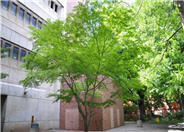
Common name:Honeylocust
Botanical name:Gleditsia triacanthos var. inermis
Honeylocust are prized for their fine-textured leaves that provide a pleasant, dappled shade. Generally with light green leaves; some cultivars have yellow spring growth. Open and spreading crown makes for a fine shade tree. Bark is a greyish-brown and furrowed. sizes range from 25 to 50 feet or more, with a spread generally less than the height. Golden yellow fall color and open winter silhouette provides attractive fall and winter appearance. Deciduous.
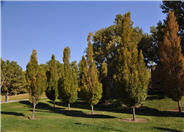
Common name:Dawyck European Beech
Botanical name:Fagus sylvatica 'Dawyck'
This European beech grows up to 45 feet tall but only 15 feet wide, making it well suited to smaller urban settings and as an architectural feature. As with other beeches, it has dark green leaves with wavy margins. Leaves turn golden yellow in the fall.
| Designer: Ward and Child | WC Place 2 |
Photographer: GardenSoft |
Water Saving Tip:
Apply a layer of mulch around plants to reduce moisture loss.
Choose organic mulches, such as shredded bark, compost or aged sawdust.
